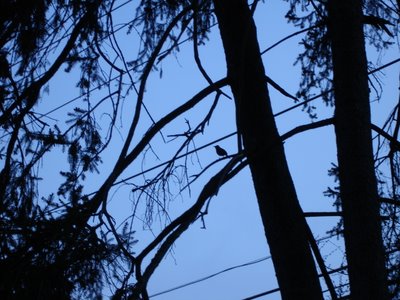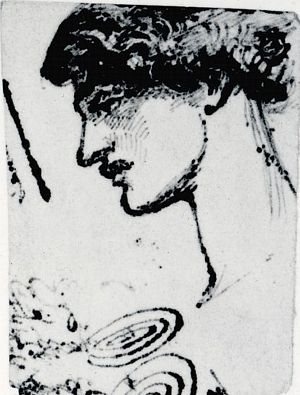This one's for you.

Like the rockin' cool verse-spinning DJ I am in my fantasy life (in which people are just as likely to trip out to Hopkins and Whitman as to the latest dance mix), I'm sending this one out to my good friend Four Inches of Ego, at this close of the first day that's seen me open the windows and all the doors, letting the sun and the breeze into the house and my loud dishwashing music out of it. And just remember: if you don't like it...
Ars Poetica?
I have always aspired to a more spacious form
that would be free from the claims of poetry or prose
and would let us understand each other without exposing
the author or reader to sublime agonies.
In the very essence of poetry there is something indecent:
a thing is brought forth which we didn't know we had in us,
so we blink our eyes, as if a tiger had sprung out
and stood in the light, lashing his tail.
That's why poetry is rightly said to be dictated by a daimonion,
though it's an exaggeration to maintain that he must be an angel.
It's hard to guess where that pride of poets comes from,
when so often they're put to shame by the disclosure of their frailty.
What reasonable man would like to be a city of demons,
who behave as if they were at home, speak in many tongues,
and who, not satisfied with stealing his lips or hand,
work at changing his destiny for their convenience?
It's true that what is morbid is highly valued today,
and so you may think that I am only joking
or that I've devised just one more means
of praising Art with the help of irony.
There was a time when only wise books were read,
helping us to bear our pain and misery.
This, after all, is not quite the same
as leafing through a thousand works fresh from psychiatric clinics.
And yet the world is different from what it seems to be
and we are other than how we see ourselves in our ravings.
People therefore preserve silent integrity,
thus earning the respect of their relatives and neighbors.
The purpose of poetry is to remind us
how difficult it is to remain just one person,
for our house is open, there are no keys in the doors,
and invisible guests come in and out at will.
What I'm saying here is not, I agree, poetry,
as poems should be written rarely and reluctantly,
under unbearable duress and only with the hope
that good spirits, not evil ones, choose us for their instrument.
Berkeley, 1968
--Czeslaw Milosz
Seriously: one of the things that this poem and George Eliot's Daniel Deronda (which I bring up because 4"oE is reading it right now) have in common is their attention to what it feels like to be between projects, on the cusp of a new life goal, in the midst of an attempt at vocation--what it feels like to be possessed by a greater force, but perhaps not quite to understand how or why you're being possessed just yet, or what it feels like to want to be possessed by some greater goal, even if you don't yet know what it will be. "How difficult it is to remain just one person," Milosz notes. "[I]nvisible guests come in and out at will." Eliot's Mordecai waits on that bridge for the visible guest to appear, to join with him, to be the figure he's anticipated. A difficult grace is required of us if we're going to go along with that idea of having the will and the spirit and the belief but not yet the vessel, the vehicle, the means, the mover. But keep going back to the bridge at sundown, my friend. (And do not become tubercular.) The boat will come along. What you're waiting for will materialize.


1 Comments:
When I first began Deronda I was heading off to CAA and expressed my transitional angst to K. She suggested that perhaps Deronda was not the best novel for me at the moment. This post states perfectly why it is exactly what I should be reading. What I take away is not the anxiety, but that "mingling of inconsequence which belongs to us all, and not unhappily, since it saves us from many effects of mistake..." I am not sure that I will figure it out, but I also am not afraid of the doubt. I am frightened, but that is the nature of being, or at least I guess it is.
Thank you for this post, for re-enforcing my hope, while comforting the doubt. I may not have known you forever, but I somehow consider you one of my dearest friends. The fact that you take the time to write this makes me feel blessed -- on top of so many other blessings -- despite the fact that I doubt the premise of blessing.
And now I don't know how to finish this, so i shall simply trust that you understand.
Post a Comment
<< Home